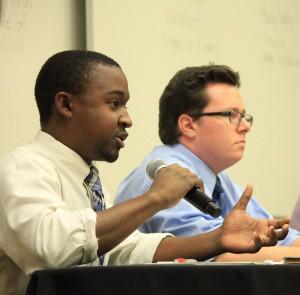Student groups debate election, candidates
USC Democratic and Republican students discussed the policies of their respective candidates, President Barack Obama and Republican challenger Mitt Romney, in a debate Wednesday night in hope of gathering a few more votes in the last days before the election.

Engagement · Christian Patterson (left), current events director for Trojans for Obama, and Fritz Pielstick, political director of College Democrats, discuss Obama’s platform on Wednesday. – Ricardo Galvez | Daily Trojan
Panelists included Maddy Lansky, president of USC College Republicans; Alex Yebri, president of Trojans for Romney; Fritz Pielstick, political director of USC College Democrats; and Christian Patterson, current events director of Trojans for Obama. USC’s Jesse M. Unruh Institute of Politics Director Dan Schnur moderated the debate.
The panelists faced off on topics ranging from healthcare and economics to foreign policy.
In her opening statement, Lansky emphasized the struggles she and her peers currently face as graduating seniors looking for employment and the ongoing economic difficulties facing the United States.
“My friends and I are freaking out about our job prospects. The economy is still in the tank. We’re looking to move back home with our parents,” Lansky said. “I don’t think this is the hope and change that anyone voted for four years ago, when they voted for Barack Obama.”
The Republicans also said Romney’s plan encourages the growth of businesses by reducing corporate taxes and his policy against raising taxes for private citizens would most effectively reduce the federal deficit.
Democrats underscored the successes of Obama’s stimulus package and the bailout of the automobile industry in creating and saving jobs. They also highlighted the necessity of lowering taxes on the middle class to encourage spending, while raising taxes on the wealthy.
“You cut spending across the board … but you can’t just cut spending,” Pielstick said. “You need to increase taxes on the people the who have the greatest capacity to pay them, the wealthy people of this country, and that’s what President Obama is going to do.”
Panelists also debated the economic and social advantages and disadvantages of Obama’s Affordable Care Act. The students in favor of Romney pointed out that Obama’s health care plan lacked bipartisan support, and expressed the importance of restoring funding to Medicare and Medicaid as well as awarding states more control of healthcare.
Democrats said the reforms succeeded in ensuring that more Americans had access to affordable, quality healthcare.
“Thirty million people didn’t have access to healthcare in this country, and people were dying because they couldn’t afford it,” Patterson said. “He saw a crisis, he saw people were suffering, and he saw that Republicans weren’t willing to do anything about it.”
The panelists from both parties agreed that Iran is currently the United States’ chief foreign threat. However, Democrats advocated for multilateral military engagement should the U.S. need to intervene further, while Republicans said that it is important to keep a U.S.-run option on the table.
“Different situations warrant different responses, especially in the international arena when things get very complicated very quickly,” Lansky said. “However, multilateral action isn’t always effective. We simply don’t have the time sometimes to just wait for the U.N. to approve of everything we do.”
Each side used their closing statement to emphasize their candidate’s qualifications for improving the nation’s economy and advocate for the safety and civil liberties of American citizens.
